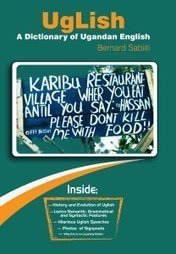Before we moved to Uganda, I didn’t realize a nation in Africa would call one of their main national languages “English.” I just didn’t know! But in Uganda, just about anyone who has been to school knows English, at least to some degree. And English is considered one of the national languages here.
It is not unusual to see Ugandans walking down the street speaking English to one another even though they may know another African language.
English is required in school here, especially after a few years of the primary grades. Secondary school students are supposed to only speak English to one another and all teaching is received in English. So it is easy to understand why everyone speaks English that has gone to school.
If there is a group gathering, there is often interpretation in English and not just because foreigners might be present. There are many, many languages in Uganda (in our area one of the primary ones is Luganda) but the common language throughout the country is still English with Swahili more prevalent in some areas. Where we live, Luganda is the more prevalent language. However, the deeper you are in the village, the less English you will find (same within the islands of Lake Victoria) as less people have completed secondary school education.
If someone has not gone to school (or perhaps only had a few years in primary school), they might not know English. But nowadays (especially the nearer they are to bigger towns and cities) one need not go too far before finding someone that does speak English here. As an American, this has made communicating easier for me overall. But here in Uganda, there is a special kind of English. It’s called Uglish.

But what is Uglish, you say? Well, it is a word coined for the English that Ugandans speak here. With a heavy British English history because of colonization by England, many British English words remain. But Uganda English is definitely not purely British English. Uglish is Uganda’s unique way to express itself in English. As unique as Uganda itself, some of its words are as well.
I may not know British English very well, but it has been fun to learn the “Uglish” spoken here. “Smart” doesn’t mean intelligent or witty; rather, “smart” can mean that you are “looking good!” When one is dressed up in their Sunday best, they are called “smart.” One doesn’t use “blinkers” on their vehicles here, but rather, “indicators.” Closing the “boot” of your car is actually what is referred to as closing the “trunk” here.
Some common sayings might include: “You are lost!” This means that they have not seen you for a long time. Speed bumps are called “speed humps.” A “bath room” is where you bathe. “Toilet” is for other business. When you move to a new place, you are “shifting.” And “well be back” means welcome back after an absence. And “chips” are French fries, not potato chips as we know them! (Those would be called “crisps.”) Or get this: “Extend a bit.” That means you need to move forward some. How about this one: “It’s paining me.” In other words, it hurts!
A “store” is not a shop or supermarket. Rather, it is a pantry or any place that you store your items really. “It’s over” or “It’s finished.” There is no more of whatever you are discussing. And, “I am about.” This means you are about to finish or about to reach, whichever the context refers to. Or get this one: “You are looking fat!” This one is actually a compliment here. You are healthy and looking well.
One of my memories involves the “You are looking fat” phrase. I was walking through the market and looking at a food stall. The lady was being quite pleasant and made the comment. I smiled and said, “Thank you.” Then she said started giggling. I looked at her inquisitively to which she replied, “You are with child.” I told her no and explained that I am already 50, and that I could not be pregnant. She just shook her head and continued to giggle under her breath. Later I learned that it is not the custom here to reveal that you are pregnant until you are about to pop! Surely the lady didn’t believe me when I said I was not pregnant … because she knew otherwise! It was only a matter of time … oh, my!

One of favorite Ugandan English (I mean Uglish) words is “rolex.” A rolex is definitely not known as a fancy, expensive watch in Uganda. Instead, a rolex is a rather scrumptious street food that you can purchase for way less than $1.00 at a small stand. It is a chapatti (a flat bread, thicker and oilier than a tortilla) with eggs and some vegetables. The eggs with small pieces of tomato, onion and sometimes other vegetables are prepared something like an omelet. Then the eggs are placed on top of the chapatti and it is rolled up. Rolled up … rolled eggs … thus, ROLEX!!! Actually rather tasty!
Oh, so much fun learning the different meanings of similar words! Uganda is full of treasures and pleasantries … an endless Uganda English dictionary to learn! So come visit Uganda and learn some Uglish! Uganda will not disappoint.

